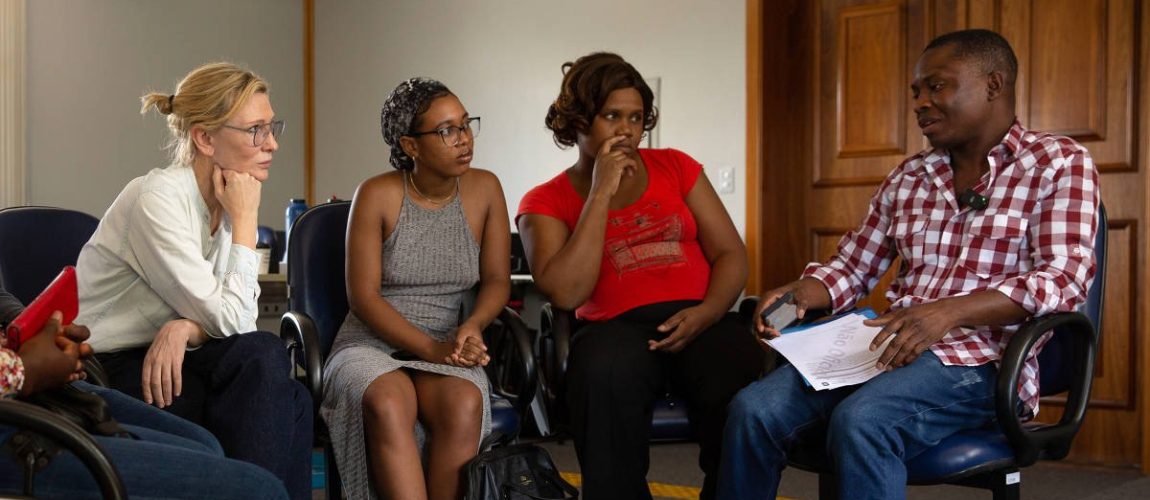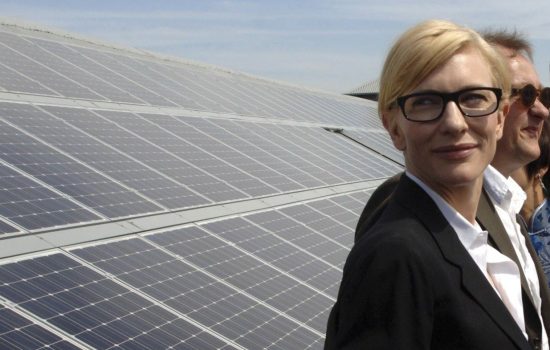Cate Blanchett visits Brazil in her capacity as UNHCR Goodwill Ambassador. She met with people who are affected by the destructive flooding that happened in several parts of Rio Grande do Sul in May 2024.
You can follow UNHCR on their social media platforms (Twitter, Facebook, Instagram, YouTube) for updates and you can also help spread awareness of the plight of refugees by sharing their posts. If you would like to donate, you can follow the link here.
UNHCR Goodwill Ambassador Cate Blanchett was in the southern state of Brazil meeting with refugees and local people who lost their homes and livelihoods after the devastating floods in May 2024.
“Every refugee I met in Brazil, has experienced the double sometimes triple horror of being forcibly displaced not once or twice but three times- each time losing everything and having to rebuild their lives from scratch. More and more frequently this displacement is caused by extreme climate events.
I met with Johanna, a refugee single mother from Venezuela who, along with her three young children, lost her job her home in the May floods and was without food or power for days on end. She told me ‘my kids are still so traumatized, when it rained yesterday they hid under the kitchen table . I must be prepared for when it floods again. I need to rebuild with bricks this time.’
Here in Brazil, Johanna told me, refugees and host communities alike have benefitted from the support of both UNHCR and inclusive government policies. But Brazil is a country, like many, deeply affected by catastrophic climate disasters. I kept thinking ‘where do people go when there is nowhere left to run?’ There is a profound injustice that those most affected by climate change are least responsible for climate pollution. It is critical that those affected by climate events, including refugees, are folded into preparedness, response and reconstruction plans.
It is also critical that the international community remember our shared humanity and thus our shared responsibility so that more resources are dedicated to those communities most exposed to the negative impact of climate change. Being able to rapidly direct funds to people made vulnerable by climate disaster is not a thing of the future. It is happening now. Right now.”
Interview below is Google translated from Portuguese to English.
Ambassador of the United Nations High Commissioner for Refugees (UNHCR), the Australian actress and two-time Oscar winner Cate Blanchett visited territories affected by the flood that hit the state. The itinerary included stops in Porto Alegre and cities in the Taquari Valley.
Kelys Hernandez was cooking in the shack where she lives with her husband and four children on Monday afternoon (16) when she heard a commotion coming from the street. Outside, asking for her in the last alley of Asa Branca, a locality in the Sarandi neighborhood of Porto Alegre, was one of Hollywood’s biggest stars. In a quick and secretive visit to Rio Grande do Sul this week, Australian actress Cate Blanchett spent 48 hours traveling through territories affected by the flood that hit the state in 2024.
Ambassador for the United Nations High Commissioner for Refugees (UNHCR), Cate had been planning the visit since July. Working globally to help vulnerable communities , she has a special interest in the effects of climate change. Dodging puddles on the narrow Rua Farroupilha, she wanted to hear Kelys tell her story of how the May flood had affected her family.
A Venezuelan who has lived in the capital for five years, Kelys put down her pans and leaned over the wooden door of the porch. Faced with the tall blonde who spoke a language she couldn’t understand, it took her a while to understand what was happening.
“I had a translator who explained it to me. Then I understood that it was an important person. She wanted to know if I was at home on the day of the flood, if I left before, if I went to a shelter and what had happened” says Kelys.
Earlier, Cate had met with other members of the Venezuelan community of Sarandi who were holding a Christmas celebration. At around 12:30 p.m., two cars entered the SOS Children’s Village Brazil, a UNHCR partner organization that supports 150 migrant and refugee families.
The staff had been warned that someone important from UNHCR would be visiting the organization, but they never imagined that it would be a movie star. They all signed a confidentiality agreement, were instructed to avoid taking photographs and were forbidden from posting them on social media.
Wearing blue overalls and sneakers, Cate walked around the shelter, played with children, talked to the counselors and held a more private meeting with the refugees, asking them to tell her their life stories and how they had been affected by the flood.
In the first half of the year, when Cate contacted UNHCR wanting to visit places impacted by climate change, two options came up. The first was Belém, the host city of COP30 in 2025 and where the commission maintains work to welcome indigenous refugees. In the end, the destination ended up being RS because the state is home to the third largest refugee population in Brazil, with 43 thousand people, and because of the succession of floods in the last year.
At 8:30 am on Tuesday (17), Cate was already at Salgado Filho airport, ready to board a Military Police helicopter bound for Vale do Taquari . Led by the head of the Military Household and Civil Defense, Colonel Luciano Boeira, she flew over the municipalities of Lajeado, Arroio do Meio and Encantado . Flying low and close to riverside areas, Boeira showed the devastation caused by three successive floods in the region, since September 2023.
“She was quite impressed. She wanted to know how many people had been impacted and whether they were still in shelters.” Colonel Luciano Boeir
Cate disembarked in Lajeado and met with a Haitian community at the headquarters of the Public Prosecutor’s Office. Afterwards, they drove to Cruzeiro do Sul , where they drove around the town of Passo da Estrela, where 600 houses were destroyed by the force of the waters. In the afternoon, he returned by car to Porto Alegre.
Full article on Zero Hora – GZH
Australian actress and producer Cate Blanchett was in Brazil for the first time this week on a UNHCR (United Nations High Commissioner for Refugees) mission. She visited places and people affected by the historic floods that hit parts of Rio Grande do Sul in May this year, causing a humanitarian crisis .
“I am very interested in the undeniable intersection between climate disasters and the forced displacement of people,” said the actress in an exclusive interview with Folha on Wednesday, at Guarulhos International Airport, in São Paulo, during the connection between Porto Alegre and London.
A two-time Oscar winner, Blanchett has played mythical beings, monarchs, ordinary women and extraordinary ones. Off-screen, she has also been a UNHCR goodwill ambassador since 2016, a position in which she lends her visibility to highlighting the stories of people forced to leave their homes in search of safety.
This population reached a record figure in 2024: 122 million people.
“When I was appointed ambassador by UNHCR, my jaw dropped when I learned that there were 65 million refugees on the planet. Today we have almost double that. Three out of four refugees are displaced to areas that are greatly affected by climate change,” she points out.
During the May floods, the government of Rio Grande do Sul asked for support from UNHCR, which has extensive experience in humanitarian aid. The UN agency opened an emergency office in the state, provided training to local authorities on shelter construction and management, and provided 300 more modular homes.
In October, Rio Grande do Sul became the first Brazilian state to enter into a partnership with UNHCR to develop a state climate contingency plan.
The topic was discussed at a meeting with Governor Eduardo Leite (PSDB), who presented the actress with a book by Clarice Lispector (1920-1977). In September, a video went viral in the country in which Blanchett mentions the Brazilian writer, born in Ukraine, whom she calls “incredibly brilliant”.
As a UNHCR ambassador, Blanchett dedicates time and money to the cause. She has visited refugees in places such as Myanmar, Jordan, Lebanon, Sudan and Bangladesh, all on trips paid for out of her own pocket. She made a plea for asylum policies in a speech to the European Parliament.
The actress says that her on-camera and off-camera work have more in common than it seems. “As a goodwill ambassador, my responsibility is to bear witness to people’s individual experiences and communicate those stories in the best way possible. It sounds cliché, but as an actress, I’m also a storyteller.” she explains.
For her, the forced displacement of people should be the backdrop for more books, films and plays. “I love fantasy, but I don’t understand how the urgency of the present moment isn’t ingrained in every story we tell.”
What was your mission in Brazil?
I read about the floods in Brazil last May and I am very interested in the undeniable intersection between forced displacement and climate disasters. UNHCR offered me the opportunity to come here and meet the refugees in the region.Of course, the native Brazilian population was extremely affected by the floods, but so were the refugees, who had already been displaced many times and who need support.
What did you witness in Rio Grande do Sul?
Many deeply moving stories. I met a Haitian man in the Taquari River Valley, a father of three who was displaced after the 2010 Haiti earthquake. He is a tailor and arrived in Rio Grande do Sul full of determination to rebuild his life. He benefited from the inclusive policies of the Brazilian government and local authorities, found work and bought a small sewing shop.In the floods of September 2023, he lost everything and moved to higher ground. He saved up, bought new machinery, and, once again, was completely destroyed by the floods of May 2024.
He is a man of incredible skills and profound resilience. But as he spoke to me, his hands were shaking as he held the police report of all his clothes that had been looted after the floods.
What challenges do extreme weather events pose to refugees?
Refugees are incredibly resilient, but they need support. I was moved by stories of women whose children are traumatized by the floods. Johanna [Moya], a Venezuelan refugee, told me that her three young children hide under the table every time it rains heavily.As a mother of four, it was deeply distressing to speak to mothers who, in addition to their own trauma, are dealing with their children being impacted in ways that defy language.
I saw dogs standing on top of their little houses, which had previously been taken over by the water, and refrigerators installed on the upper floors of the houses. These are symbols of what is to come.
How do you see the current scenario of international cooperation on the climate crisis?
COP29 [the UN climate conference held last month in Azerbaijan] has frustratingly and dangerously postponed the urgent need for solutions to the climate crisis. Now we look to COP30 and Brazil, which will host the meeting after experiencing this catastrophic climate event in the south of the country.It is really important that this Brazilian tragedy is used to highlight that even communities that are not impoverished are also impacted by climate change and its increasingly devastating events.
I’m on the board of the Earthshot Prize, set up by Prince William , which invests in sustainable startups, and I’m inspired by the solutions that are emerging from areas you’d think would be relatively impoverished, because no one understands crisis better than the people who have been forced to flee because of it.
Since 2016, the number of refugees has almost doubled. More conflicts and wars have broken out, borders have been closed, and extreme weather events have intensified. How can we face this challenge?
I always try to hold on to the positive, because giving up is not an option. The first thing any disaster teaches us is that everything is interconnected.There seems to have been an understanding at the COPs [United Nations climate conferences] that forced displacement of people is deeply linked to climate. So including refugees in finding solutions is important.
Today we close our borders to these people when we are collectively responsible for climate change. I believe that countries that think they can hermetically insulate themselves from a collective global crisis will become increasingly irrelevant.
Australia has strict policies towards migrants and refugees, but has offered refuge to citizens of Tuvalu, an island that is disappearing due to rising sea levels. Are people displaced by climate change perceived differently than those fleeing other dangerous situations?
Yes. And that is disconcerting to me. I think there is a stigmatization and politicization of people who come from certain areas. I grew up in Australia when it was a multicultural country. To see it become rigid and exclude certain cultures is bizarre.A speech of yours went viral in Brazil for mentioning the Ukrainian-born Brazilian writer Clarice Lispector. You said she inspires courage in you. How?
Clarice was a Ukrainian refugee, to begin with, which I didn’t know. The first time I read her, I was only struck by her profound and poetic writing. And her complex sense of humanity.It became a point of reference for me because she is so curious to learn about things she doesn’t know. And in her writing, so ready to acknowledge who we are as individuals. But when you lose yourself in a collective effort, you become bigger and more meaningful.
I’m a big fan of her work. It took me a while to find it in English.
During her [Cate Blanchett] visit to Rio Grande do Sul, she learned about the organization’s response in the state in support of local authorities and participated in meetings with people impacted by the flood. She also visited initiatives led by refugees aimed at the socioeconomic integration of this population.
On Monday, the actress visited the Sarandi neighborhood, the most impacted in the capital by the floods in May. Cate Blanchett visited the Aldeias Infantis SOS Brasil shelter, a UNHCR partner in welcoming refugees who spent 20 days underwater. There was a Christmas party being held there.
The actress met with Johanna Moya, a Venezuelan who lives in the region and works as a recycler. In May, her house was destroyed by flooding. Cate also spoke with a health agent from the SUS, who works in the Sarandi community.
“I met Johanna, a single mother and refugee from Venezuela who, with her three young children, lost her job and home in the floods in May and was left without food or power for days on end.” Cate said during the visit.
“She told me, “My children are still very traumatized. When it rained yesterday, they hid under the kitchen table. I need to be prepared for when there is another flood. I need to rebuild with bricks this time.”” she added.
On Tuesday, the actress went to Vale do Taquari. First, she talked to Haitian immigrants in Lajeado. Then, she walked among the ruins in the Passo de Estrela neighborhood, in Cruzeiro do Sul, which was devastated by the flooding of the Taquari River.
On Tuesday night, Cate attended a dinner with Governor Eduardo Leite and Vice Governor Gabriel Souza.
During her stay in RS, the actress reflected on ongoing climate change: “There is a profound injustice in the fact that those most affected by climate change are least responsible for climate pollution. It is essential that people affected by climate events, including refugees, are included in preparedness, response and recovery plans.”
And she continued: “It is also crucial that the international community remembers our shared humanity, and therefore our shared responsibility, so that more resources are dedicated to the communities most exposed to the negative impacts of climate change.”
On Wednesday morning, Cate returned to London.
Full article on Zero Hora

Cate Blanchett speaks to Johanna Moya at the SOS Children’s Village in the Sarandi neighborhood of Porto Alegre; Johanna, who arrived in Brazil in 2019, is a member of Reide, an organization led by Venezuelan refugees. Photo by Hector Perez for UNHCR.

UNHCR Goodwill Ambassador Cate Blanchett walks through the Passo de Estrela neighborhood in Cruzeiro do Sul (RS), on the banks of the Taquari River, on her first mission in Brazil. Photo by Hector Perez for UNHCR.
“Every refugee I met in Brazil, has experienced the double sometimes triple horror of being forcibly displaced not once or twice but three times- each time losing everything and having to rebuild their lives from scratch. More and more frequently this displacement is caused by… pic.twitter.com/fOyomSef8R
— UNHCR, the UN Refugee Agency (@Refugees) December 20, 2024
Gratidão à atriz Cate Blanchett por sua visita ao RS como embaixadora do Acnur, dando visibilidade aos impactos das enchentes e às nossas ações para apoiar as famílias.
Quando a encontrei recentemente, além do prazer em compartilhar a admiração que temos pela obra de Clarice… pic.twitter.com/MyRuohJM7V
— Eduardo Leite (@EduardoLeite_) December 19, 2024
Source: Folha de S. Paulo





 A Manual for Cleaning Women (202?)
A Manual for Cleaning Women (202?) Father Mother Brother Sister (2025)
Father Mother Brother Sister (2025)  Black Bag (2025)
Black Bag (2025)  The Seagull (2025)
The Seagull (2025) Bozo Over Roses (2025)
Bozo Over Roses (2025) Disclaimer (2024)
Disclaimer (2024)  Rumours (2024)
Rumours (2024)  Borderlands (2024)
Borderlands (2024)  The New Boy (2023)
The New Boy (2023) 











